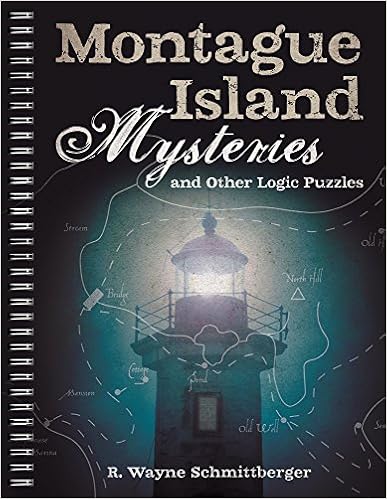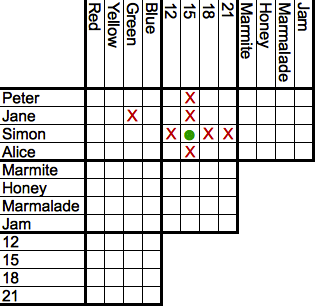Montague Island Mysteries book review
Over the course of the Pandemic, I’ve purchased a LOT of puzzle books, and I thought I’d review some of the better ones over the next few blog posts. First up is one of my favorites, Montague Island Mysteries by Wayne Schmittberger.
 I picked up this book because I’m a fan of old fashioned logic puzzles, also called “Einstein’s puzzle” or “Zebra Puzzles”. The kind where there is scenario involving groups of things that are connected in some way. For example, there might be a group of girl scouts, each of whom ate a different flavor of ice-cream, and each of whom has a different merit badge, has a different pet, participated in a relay-race and you have to figure out, from a limited set of clues, who ate what, who wore what, who petted what, and who won the race.
I picked up this book because I’m a fan of old fashioned logic puzzles, also called “Einstein’s puzzle” or “Zebra Puzzles”. The kind where there is scenario involving groups of things that are connected in some way. For example, there might be a group of girl scouts, each of whom ate a different flavor of ice-cream, and each of whom has a different merit badge, has a different pet, participated in a relay-race and you have to figure out, from a limited set of clues, who ate what, who wore what, who petted what, and who won the race.
This puzzle is traditionally called a “logic puzzle”, but the term precedes the popularization of other kinds of puzzles that involve logic, including Sudoku, Kakuro, Star Battle, Slitherlink, Battleship Solitaire, and pretty much every puzzle on my website. So, for clarity, I prefer to call this specific variety a “verbal logic puzzle”, to distinguish them from the other kinds puzzles that employ logic.
I don’t actually publish verbal logic puzzles at Krazydad (for reasons I explain here), but I very much enjoy solving them. There are other publishers that publish them, including Puzzle Baron, and you can buy them in various supermarket and drugstore magazines published by Dell/Pennypress.
Everett Kaser has also published a series of games which use this format, which I find delightful. I have purchased all of his iPad games and several of his desktop games.
 Most of these publishers tend to publish a fairly straightforward form of this puzzle, in that there is one of everything. In other words, if there are five girl scouts, then there are also five unique flavors of ice-cream, five unique sweaters, five unique merit badges and so on. These puzzles can be typically be solved on a grid which lays out all the item’s interactions, using basic inferences and the process of elimination. The puzzle is typically accompanied by a grid, like the one on the left.
Most of these publishers tend to publish a fairly straightforward form of this puzzle, in that there is one of everything. In other words, if there are five girl scouts, then there are also five unique flavors of ice-cream, five unique sweaters, five unique merit badges and so on. These puzzles can be typically be solved on a grid which lays out all the item’s interactions, using basic inferences and the process of elimination. The puzzle is typically accompanied by a grid, like the one on the left.
If you are a fan of more challenging puzzles, like me, then I think you will really like the Montague Island books.
These books start with that basic logic template, but take it into a lot of interesting and new areas. Each book has one or two puzzles of the basic grid type, as described above, but all the other puzzles introduce various twists on the formula which increase the level of difficulty. These twists include the introduction of potentially false statements, the sharing of items (e.g. two or more people might like the same flavor of ice cream), the use of spatial reasoning, such as the layout of the house or the distances between points-of-interest on the island, poker hands, and more. Several of the puzzles can’t really be solved using a traditional grid and require that you find a better way to diagram the statements.
One of my favorite puzzles in the book involved reconstructing a set of Texas hold’em poker hands, a puzzle which brought to mind the elegant retrograde chess puzzles of the late, great Raymond Smullyan.
Another thing I love about these books is the thematic cohesion: Each book has a story which runs through the book, and the puzzles involve the same people. In the first book, seven guests are visiting a mansion at Montague Island over a series of consecutive weekends to solve a series of mystery puzzles. The hosts (Gordon and Nina), the household staff (Alistair, Evelyn, Lyle, Molly, Nolan, Sandy), and the guests (Beth, Charles, David, Frank, Jessica, Karen, Taylor) all conveniently have names which start with a different letter within their groups, which is useful for note taking (you’ll want to to take notes, trust me). The theme of the books resembles a classic Agatha Christie book, and provides a measure of cosy mystery, which adds to the fun.
Borrowing liberally from the whodunnit genre, many of the puzzles require you to solve a crime or murder, and require you to identify the perpetrators from a list of the seven guests. The clues come in the form of statements from the hosts, the household staff, and the guests. In these scenarios, the perpetrators of the crime may or may not be lying, and of course, you don’t know who is lying!
The author of the Montague Island series is R. Wayne Schmittberger, who edited Games Magazine for many years before retiring. As a former editor, Schmittberger clearly has the attention to detail needed to construct these puzzles and he provides extremely detailed explanations of the solutions with virtually no errors. Judging from the variety of the puzzles, it’s abundantly clear that these puzzles were constructed by hand (unlike, say, the puzzles on my website or the Puzzle Baron books). Hand construction means greater variety in puzzle construction, but also means there is greater opportunity for human error (especially with puzzles as intricate as these) and I did spot a single error, which I reported to the publisher (I’m told it may have already been fixed in a later printing).
These are large books (8.5″ x 11″), published with a “lay flat” coil binding on non-glossy paper which takes pencil well. I wish more puzzle books were printed with coil bindings (and that it was more economical for me to do so with my own books)!
The first book has 40 puzzles, each of which took me at least several hours (and in some cases, a couple days) to solve. This speaks to the difficulty of the puzzles — a traditional logic puzzle generally takes me about 20-30 minutes, give or take.
I am currently midway through the second book in this series (there are currently four volumes, the most recent being published in December of 2021. I have found the puzzles in the second book to be a bit harder than book 1, and the difficulty cadence to be a little more random than in the first book, which starts easier and gets harder.
I look forward to eventually getting through all the books in this series, as there are very few (or no?) other books which hit the same “sweet spot” of having a wide variety of verbal logic puzzles and that lovely cosy thematic cohesion. I hope Schmittberger’s choices ultimately influence other puzzle authors, and we see more books that exhibit these great qualities.

